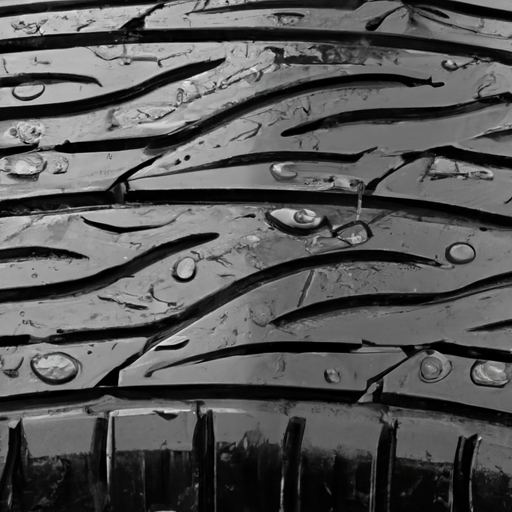If you live in an area where the weather can be unpredictable and change at the drop of a hat, you may be wondering if it’s safe to use summer tires all year round. After all, summer tires are specifically designed to provide optimal performance in warm conditions. In this article, we will explore whether it’s advisable to use summer tires in areas with sudden weather changes and what potential risks you may encounter if you do. So, before you make a decision about which tires to use, let’s dive into this topic and find out what experts have to say.

The Importance of using appropriate tires
Understanding the purpose of different tire types
Choosing the right type of tires for your vehicle is crucial, as it directly impacts your safety and the overall performance of your vehicle. Different tire types are designed to perform optimally under specific weather and road conditions. By understanding the purpose of each tire type, you can make informed decisions and ensure that you have appropriate tires for your vehicle.
The impact of using mismatched tires
Using mismatched tires, especially in areas with sudden weather changes, can have serious consequences. Mismatched tires refer to a combination of tires with different tread patterns, sizes, or types. This mismatch can significantly affect the handling, stability, and performance of your vehicle. It can result in reduced traction, compromised braking ability, and increased risks of accidents. Therefore, it is essential to use appropriate tires that are suitable for the weather conditions you regularly encounter.
Understanding Summer Tires
Characteristics of summer tires
Summer tires, also known as performance tires, are specifically designed to provide optimal performance in warm weather conditions. They are made from a rubber compound that remains flexible at higher temperatures, ensuring better traction and grip on dry roads. The tread patterns of summer tires are also designed to dissipate water efficiently, reducing the risk of hydroplaning. Additionally, summer tires have a shallower tread depth than other tire types, allowing for better road contact and improved handling.
Advantages of summer tires
Summer tires offer various advantages when used in appropriate weather conditions. They provide excellent cornering stability, offering enhanced control and responsiveness on dry roads. Their superior grip and traction allow for shorter braking distances, improving overall safety. Additionally, summer tires deliver a more comfortable and quiet ride compared to other tire types, enhancing the overall driving experience.
Weather Variability in Certain Areas
Regions with unpredictable weather patterns
Some areas experience unpredictable weather patterns, characterized by sudden changes in temperature and precipitation. These regions often witness unexpected shifts from warm to cold weather, or vice versa, within a short period. Such rapid weather changes can pose challenges for drivers, especially if they are not adequately prepared with the appropriate tires.
Common weather changes in these areas
In areas with sudden weather changes, it is common to experience unexpected rain showers, thunderstorms, or even snowfall during the summer months. The temperature fluctuations can lead to unpredictable road conditions, making it essential to have tires that can handle various weather scenarios. Ensuring that your tires are suitable for these changes is crucial to maintain safety and optimal performance on the road.
Performance of Summer Tires in Sudden Weather Changes
How summer tires handle sudden weather changes
Summer tires are designed to perform best in warm weather conditions. They excel in dry and hot pavement, providing excellent traction and grip. However, when faced with sudden weather changes, such as unexpected rain or a rapid drop in temperature, summer tires may struggle to maintain their performance. The rubber compound of summer tires can harden in colder temperatures, reducing their grip on wet or icy surfaces. This can compromise your vehicle’s handling and increase the risks of accidents.
Limitations of summer tires in certain weather conditions
While summer tires are highly effective in warm weather, they have limitations when it comes to handling sudden weather changes. The shallower tread depth of summer tires, which allows for better road contact on dry surfaces, can become a disadvantage when faced with wet or snowy conditions. The reduced tread depth hinders the tire’s ability to disperse water or channel snow, resulting in reduced traction and increased chances of sliding or skidding. Therefore, using summer tires in areas with sudden weather changes may not provide the desired level of safety and performance.

Safety Considerations
The importance of maintaining proper traction
Traction is crucial for safe and controlled driving. It refers to the grip between the tires and the road surface, enabling the vehicle to accelerate, brake, and steer effectively. In sudden weather changes, maintaining proper traction becomes even more critical. Inadequate traction can lead to loss of control, longer braking distances, and an increased risk of accidents. Choosing tires that are appropriate for the current weather conditions plays a vital role in ensuring optimal traction and enhancing safety on the road.
Implications of using incorrect tires in sudden weather changes
Using incorrect tires in sudden weather changes can have severe implications. In areas with unpredictable weather patterns, unexpected rain or snow can make roads slippery and hazardous. If your tires are not designed to handle these conditions, you may experience reduced traction, compromised handling, and increased risks of accidents. It is therefore crucial to equip your vehicle with tires that are suitable for the prevailing weather conditions to ensure your safety and the safety of others on the road.
Alternative Tire Options
All-season tires as a versatile choice
All-season tires are designed to offer a balance of performance and functionality in a variety of weather conditions. They are specifically engineered to provide adequate traction in both wet and dry conditions, as well as light snow. All-season tires have a tread pattern that allows for improved water evacuation, reducing the risk of hydroplaning. While they may not deliver the same level of performance as summer tires in warm weather or winter tires in winter conditions, all-season tires offer a versatile option for areas with changing climates.
Considerations for winter tires in changing climates
In regions where sudden weather changes result in significant snowfall or icy roads, using winter tires becomes essential. Winter tires, also known as snow tires, are specifically designed to handle cold temperatures, snow, and ice. They are made from a rubber compound that remains pliable even in freezing temperatures, ensuring maximum grip and traction. The deeper tread patterns and added siping of winter tires provide enhanced traction on snow and ice-covered roads. If you frequently encounter severe winter conditions, it is advisable to invest in a set of dedicated winter tires to ensure your safety and enhance your vehicle’s performance.

Adapting Driving Techniques to Changing Weather
Tips for safe driving in unpredictable weather
To safely navigate through sudden weather changes, it is essential to adapt your driving techniques accordingly. Reduce your speed to accommodate the road conditions and maintain a safe following distance from other vehicles. Avoid sudden acceleration, braking, or turning, as these actions can lead to loss of control. Keep a keen eye on the road ahead, being cautious of any potential hazards caused by the weather changes. By staying alert and adjusting your driving style, you can mitigate the risks associated with sudden weather changes.
The role of tire pressure in handling sudden weather changes
Tire pressure is a crucial element in handling sudden weather changes. Fluctuations in temperature can cause changes in tire pressure, impacting their performance and safety. It is important to regularly check your tire pressure and adjust it according to the manufacturer’s recommendations. Underinflated tires can reduce traction and increase the chances of hydroplaning, while overinflated tires may result in reduced contact with the road surface. Properly inflated tires ensure optimal grip and control, enhancing your ability to handle sudden weather changes.
Factors to Consider Before Using Summer Tires in Changing Climates
Local climate and weather patterns
Before using summer tires in areas with changing climates, it is crucial to consider the local climate and weather patterns. Evaluate the typical weather conditions you encounter throughout the year, including temperature ranges, precipitation, and the frequency of sudden weather changes. Understanding the prevailing climate will help you make an informed decision regarding tire selection and whether summer tires are appropriate for your area.
Frequency and severity of sudden weather changes in the area
In addition to considering the general climate, it is essential to assess the frequency and severity of sudden weather changes specific to your area. If sudden weather changes are infrequent or mild, summer tires may still be suitable for your needs. However, if your region experiences frequent and severe weather fluctuations, investing in tires specifically designed for those conditions becomes imperative. By understanding the local weather patterns, you can make a well-informed choice to ensure your safety and optimal performance on the road.

Consulting with a Tire Expert
The value of professional advice on tire selection
With the wide range of tire options available, seeking the advice of a tire expert can be highly beneficial. Tire professionals have extensive knowledge about different tire types, their performance characteristics, and suitability for specific weather conditions. They can assess your driving needs, consider the local climate, and recommend the most appropriate tires for your vehicle. Consulting with a tire expert ensures that you make an informed decision, providing you with peace of mind and maximizing your safety on the road.
Taking into account personal driving habits and needs
When considering tire selection for changing climates, it is important to reflect on your personal driving habits and needs. Factors such as the average distance you drive, the terrain you encounter, and your preferences for comfort and performance should all be taken into account. Sharing this information with a tire expert will allow them to recommend tires that align with your specific requirements, ensuring that you have the most suitable tires for your driving style and the changing climate.
Conclusion
Using appropriate tires is of utmost importance, especially in areas with sudden weather changes. The right tires ensure optimal performance, safety, and control, allowing you to navigate through diverse weather conditions with confidence. While summer tires offer exceptional performance in warm weather, they may not be suitable for sudden weather changes as they are designed for specific conditions. Considering alternative tire options, such as all-season or winter tires, may provide greater versatility and safety in areas with changing climates. By consulting with a tire expert and considering various factors like climate, weather patterns, and personal driving habits, you can make informed decisions and enjoy a safe driving experience throughout the year.


